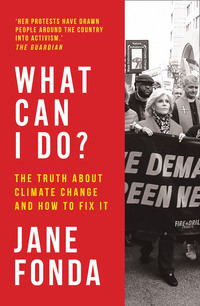
What Can I Do?
I learned so much during the teach-in. I had not known the role the ocean plays in generating the very air we breathe. Learning what business as usual has done to this and other parts of the ocean made it hard to sleep. I would lie in bed having conversations in my head with the members of the Senate who deny or delay on climate, feeling impotent because I couldn’t find the words that would make them understand what’s at stake and persuade them to do something.
Could they ever understand what it means that the Antarctic peninsula is warming faster than almost anywhere else on earth except the Arctic, which is warming even faster? Did they know that as we lose that sea ice, we’re losing the population of krill, tiny shrimplike crustaceans that are critical food, the energy source for penguins and whales and so much else?
Could I convince them of how important it is to protect the whales because of their vital role in fighting climate change? One whale can sequester thirty-three tons of carbon over its lifetime, which it does by pooping. As whales swim, they eat plankton, which absorbs carbon, and when they turn that into poop, the poop sinks to the bottom. When they die, their bodies sink to the ocean floor, taking that carbon out of the atmosphere and sequestering it at the bottom of the sea. So throughout their lives, and even when they die, they are taking carbon out of the lower atmosphere.
If only our government representatives understood that if we were able to rebuild populations of whales to the point where they were before we started killing them, we would be able to capture about 1.7 billion tons of carbon per year. In spite of the scientific consensus, many of them still deny that carbon emissions are a problem.
At the very end of the teach-in, Ted had said something that surprised me. He said that when he had turned seventy, he thought it was time to slow down, relax, and enjoy. “And then you called and told me what you were doing in D.C. to confront the climate crisis and you asked me to engage in civil disobedience with you and risk arrest. The idea of getting arrested somehow focused my brain a little bit, and I began to realize that everything we’ve done, that people all over the world are doing, to make the oceans vital and healthy, can be undone because of climate change, the acidification and warming of the oceans and the harm that plastics are doing, and that’s related to oil as well … it all comes back to fossil fuels. I’m starting to think about all this in a new way.”
This was only our third Fire Drill Friday, and already Ted Danson, big influencer, was thinking in a new way. Do you have any idea what that meant to me?
SHOULD WE BE EATING FISH?
Ted Danson
“I don’t think we need to stop eating fish. But we need to be educated about what fish we shouldn’t eat: the big billfish, swordfish, king mackerel, sharks. The top feeders. You shouldn’t be eating those fish, because they have so much mercury in them from eating little fish further down the food chain.” Another reason not to eat the larger fish is that they have a longer growth cycle before they reproduce. When you eat a bigger fish, you might have interrupted that species’ reproductive cycle, depleting the fish population over time.
“The phrase that Oceana uses is eat small, local, and wild. Sardines, anchovies. There are a lot of wonderful fish you can eat that are not dangerous to your health. But farmed fish is tricky. You don’t want to eat farmed tuna or salmon because they are carnivorous, and it takes about five pounds of ground-up wild fish to feed and make one pound of farmed salmon. Many of the small fish fed to farmed fish are ones that we could be eating directly, making farming fish inefficient.”
The Rally
At the Fire Drill Friday rally, Jennifer Jacquet, an associate professor of environmental studies at NYU specializing in marine ecology conservation and evolutionary biology, encouraged us to think of the animals around us, on land and on sea, not just as commodities. “Aquatic animals are the last wild animals hunted at a global scale for food. There are at least one trillion fish killed every year by fisheries. We don’t think about fish as species; we think about them as seafood,” she said. She noted how fish are moving toward the poles at a rate of twenty-six kilometers a decade to avoid the warmer ocean temperatures. This means large numbers of fish will be disappearing from the tropics by 2050. How fish were behaving as their environment changed was telling us something about the future.
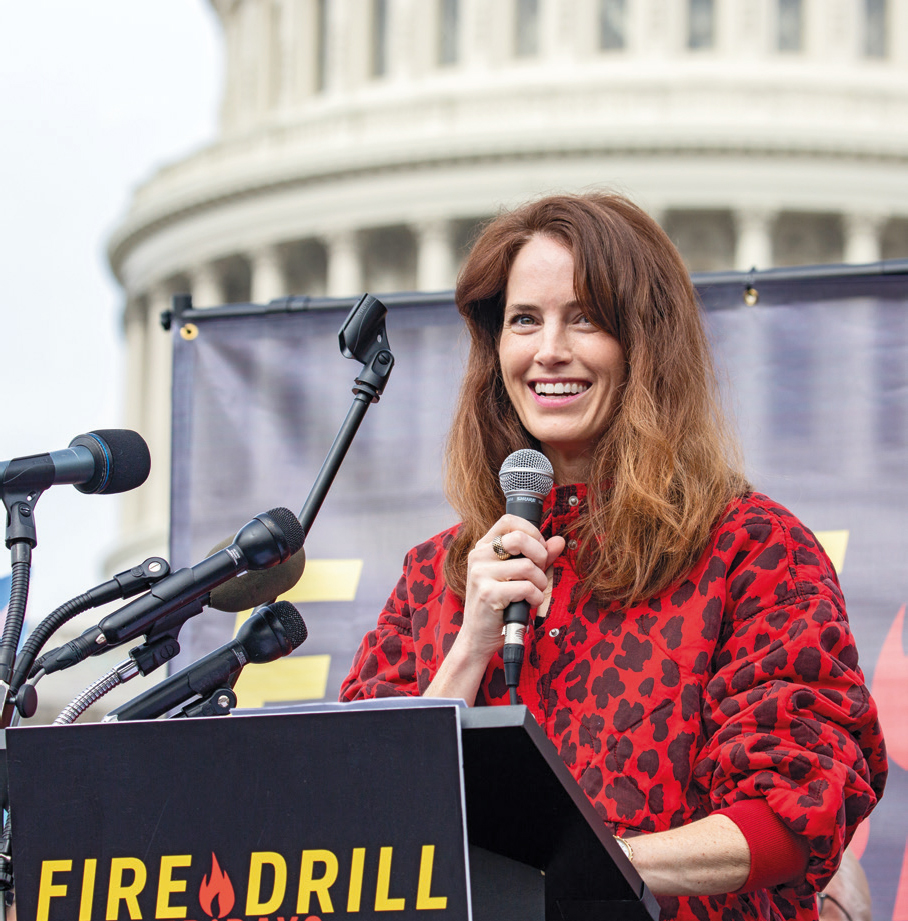
Jennifer Jacquet speaks.
“Some say the movement of fish represents opportunities for fisheries in the Arctic, and some worry about the future geopolitical conflicts over these fish. They speak about these animals merely as resources, instead of considering that this is nature sending us a signal,” she said. “Corals are bleaching, and fish are moving because we have made their world uninhabitable. They are moving so they can breathe. Climate change is just one threat to aquatic animals. The largest threat is still direct exploitation, the global fishing industry. Factory fishing has to end.”
The sea turtles face a different consequence of global warming, one that is painful to hear about. What I learned that day about them I will carry in my heart forever. As I said at the start, I have snorkeled with sea turtles, getting right up close and looking them in the eye. Kind, sorrowful eyes, they have. The reptilian version of a golden retriever. John Hocevar had already told me that because the sex of sea turtles depends on the temperature of the egg, due to warming seas practically all sea turtles in Florida are being born female. Almost no male baby sea turtles born in Florida for years. Thus no reproduction.
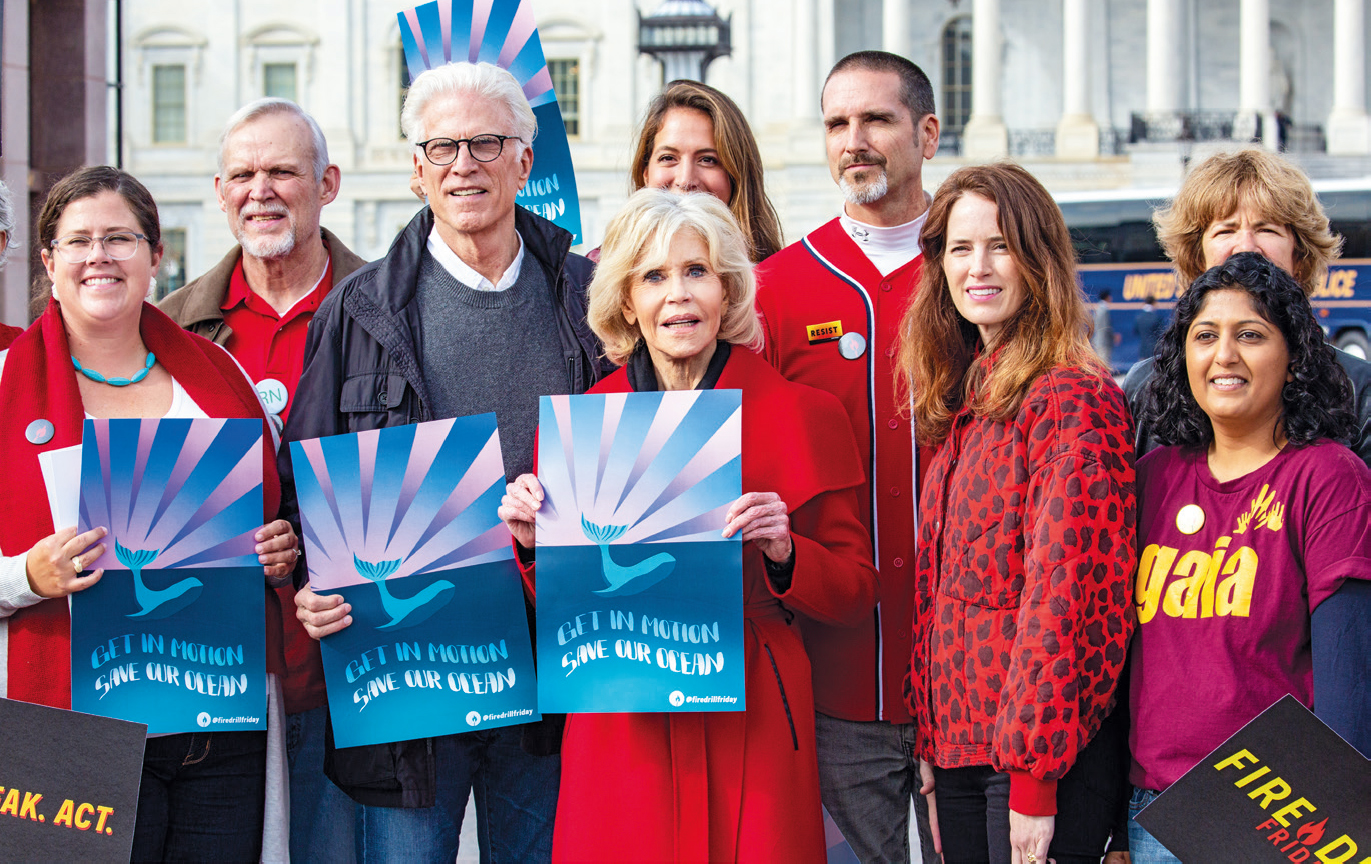
Whitney Crowder, Ted Danson, Jane, Maddy Carretero (behind Jane), John Hocevar, Jennifer Jacquet, Denise Patel, and Laura Flanders (behind Denise) pose for a shot in front of the Capitol before the rally starts.
I asked John Hocevar to be sure to say something at the rally to give us hope as well as what we can do. He did just that, saying, “I have to fight getting depressed about the damages being done to the oceans, but taking action, striving to make positive changes for the things I care about, helps with that and it can for you as well.
“It’s time to make a scene. The science is clear that our oceans are in trouble, and that we are in trouble,” John said, urging everyone to get more active.
“It’s important for us all to do what we can as individuals. But our real power comes when we work together to ensure that politicians and corporations understand that we want better options. We want a world where the choices we have available to us are not going to destroy us. When you succeed, spread the news and inspire others to do the same, and then take it to the next level, and work on your town or city, your county, your state, and your country. I promise you, you won’t be alone.”
Ted Danson and I joined many others to engage in civil disobedience. I caught sight of his face as he was handcuffed. He was radiant.
It was still daylight when we were released into the care of jail support. I got out before Ted, and when I went to hug and thank him, he took my face in his hands and said, “No, thank you, Jane. This has been important.” And the way he said it, and the way he made me look him in the eye, let me know that something had shifted in Mr. Danson.
And it wasn’t just the celebrities who spoke to me about the effect the actions had on them. Many others for whom civil disobedience was new told me, “I won’t be the same.” I have thought a lot about this. I think people’s reaction has something to do with what happens when you make the decision to put your body on the line for something you believe is right and important. You aren’t sure what’s going to happen, but you know you will be arrested and for a period of time you have no control and you go ahead and do it. For me, anyway, it’s like stepping into wholeness. You align your body and your values, and that’s something we don’t get many opportunities to do these days.
THE PLIGHT OF SEA TURTLES
Whitney Crowder
Whitney Crowder is a sea turtle rehabilitation coordinator at Gumbo Limbo Nature Center in Florida.
“Sea turtles are dying in record numbers, and it’s directly because of us,” Whitney said. She described tiny turtles starving to death, their stomachs too filled with plastic to ingest food. Other sea turtles died entangled in discarded fishing nets or weighed down by our trash. Pollution-related diseases caused tumors to cover their bodies, including their eyes and their flippers, making them blind and unable to swim. All of this she had seen firsthand.
“Every year due to strong winds, hundreds of these little sea turtles are washed back to shore along our Florida coastlines and many of them die,” she said. “This year we have found 100 percent of our dead, washed-back sea turtles with stomachs full of plastic. Every turtle is filled with plastic. In one dead baby sea turtle, we found over 104 pieces of plastic in its stomach. These hardy sea turtles, who survived the mass extinction of the dinosaurs, were being wiped out by our plastic trash, which we see clogging the surface of the water. Our plastic trash that flows into the ocean is broken down by the sun and the saltwater into smaller pieces that the sea creatures ingest. We used to think this was just a problem for the creatures that live in the waters close to the surface, but in fact it filters down all the way to the seafloor, creating hazards for sea life all along the way.
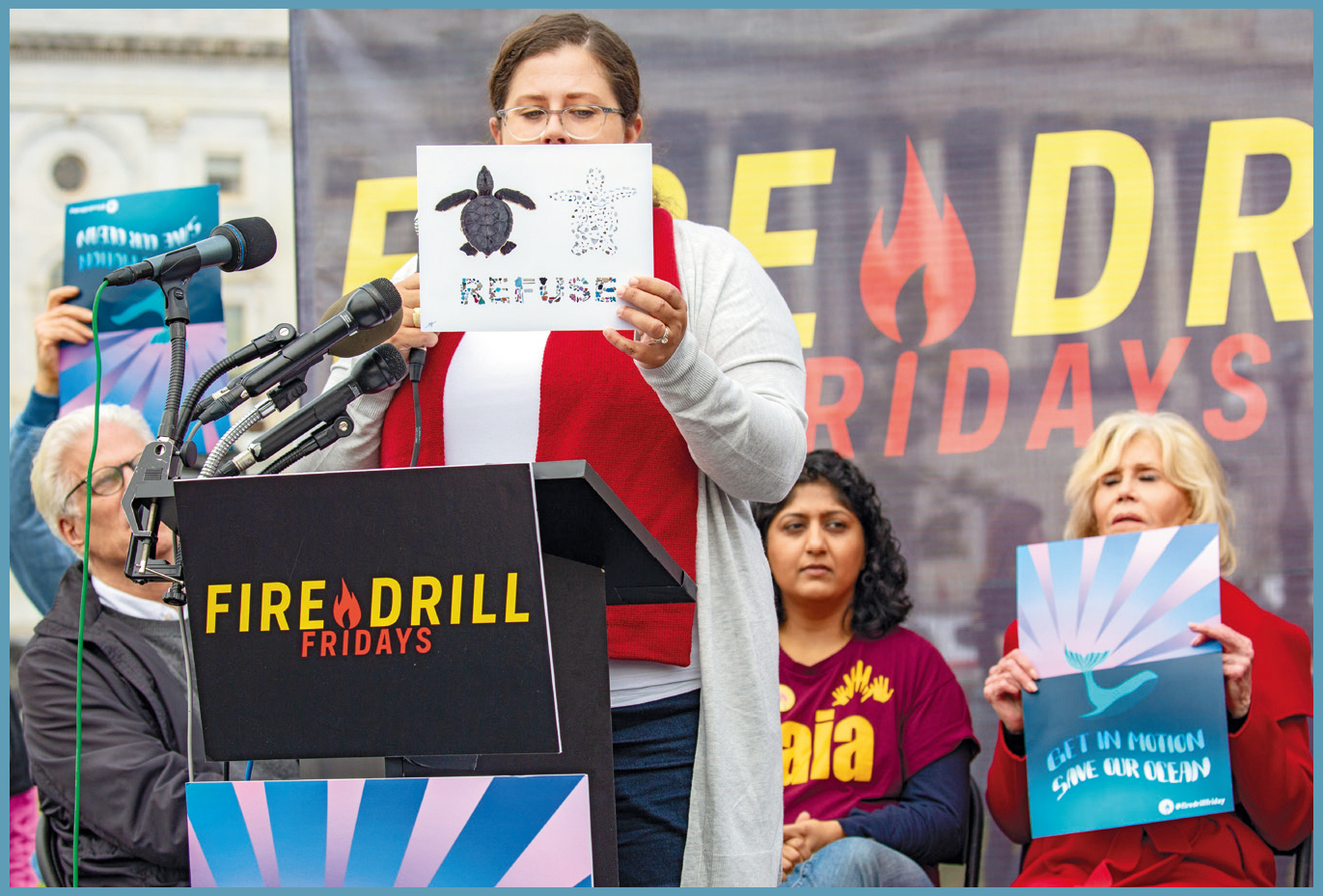
Whitney Crowder speaks. Behind her are Ted Danson and Denise Patel.
“Losing sea turtles, we create a cascade of destruction in our oceans that we may never recover from,” Whitney said. “Sea turtles are an indicator of the health of our oceans. Without healthy oceans, life on earth cannot exist. Our oceans can’t wait. I never felt like we’re running out of time to make a change until now. The sea turtles are warning us now that they are in trouble and so are we. Is it possible that by saving the sea turtles, we can save ourselves as well? We have the power to turn this around, and I think we can because the future of our children will depend on the actions we take right now.”
What Can I Do?
Whether we live near or far from the world’s oceans, we can help protect and restore ocean life. To start, simply eat less fish! Reduce your fish consumption or avoid eating fish not only for the oceans themselves but also to protect the people who rely upon fish for their sustenance and livelihoods, such as island communities. If you need to eat fish regularly, try to eat smaller—and no less delicious!—fish that are lower on the food chain, such as anchovies, sardines, herring, and mackerel. For a regularly updated resource on which seafood to eat, check out Seafood Watch (seafoodwatch.org).
Fish markets and grocery stores need to hear that their customers care about sustainability. Ask at the grocery store, seafood market, and local restaurants where they get their fish. Ask how the fish was caught, and if the overall population of that species is healthy. (You may want to review SeafoodWatch.org before you go shopping or share this resource with the folks you talk to.) Does the fishing boat use ground trawlers that destroy the ocean floor and kill tons of sea life as bycatch? Was it line caught by a local fisher? Farm raised or wild? Are the workers on this fishing boat, or with this seafood company, treated well and paid fairly? Can the retailers verify that the seafood they’re selling was not caught by enslaved or human-trafficked people? If they don’t know, encourage them to find out so they—and the customers—aren’t complicit in wrongdoing.
The employee at the fish counter, or at the checkout stand, might not be able to answer these questions, or have any power to influence the supermarket chain’s practices, so be respectful and polite. We know, however, that consistent inquiries from customers about the items a store offers can make their way to the top of the corporation and change things. If enough people ask, sustainability and ethical sourcing can become part of a grocery store’s marketing, meaning something to brag about.
Because activities on land end up impacting the ocean, our personal choices such as how we commute, garden, and shop can help reduce pollutants making their way to the ocean, especially if lots and lots of people do them. As much as you can, choose biking instead of driving, stop using toxic pesticides and fertilizers in your garden, and eliminate as much plastic waste as possible, especially single-use plastic that is used once and tossed away in minutes.
If you’re lucky enough to be able to spend time at the ocean, take pictures of the plastic waste you see on the beach or in the water. Capture the corporate logo of the company that made this waste, and let it know that you expect better. If you use social media, post the pictures and tag the companies in your posts so they know their customers are paying attention.
While changing our individual consumption habits can help, the greatest change comes from collective and political action. Ask city and school officials if they’re using toxic pesticides or fertilizers, contributors to ocean dead zones where oxygen levels are too low to support life, on park and school grounds. Recruit neighbors and others to support phasing out poisonous chemicals. Organic landscapes are better for kids, better for groundskeepers, and better for oceans. Beyond your yard and neighborhood parks, ask your workplace to reduce or eliminate the use of toxic pesticides and fertilizers on company property.
Make sure your elected officials know you care about the oceans by writing to them to share information and urge action. This requires time, but thankfully you do not have to shoulder this burden alone. There are many organizations that support ocean life and advocate for policy change. Join Greenpeace, Surfrider, Oceana, or other groups that support ocean conservation, and ask your friends and family to do the same.
And above all, remember that healthy oceans help create a healthy climate! Everything we do to promote climate solutions in this book helps protect the oceans. That’s great, because they need us, and we need them.
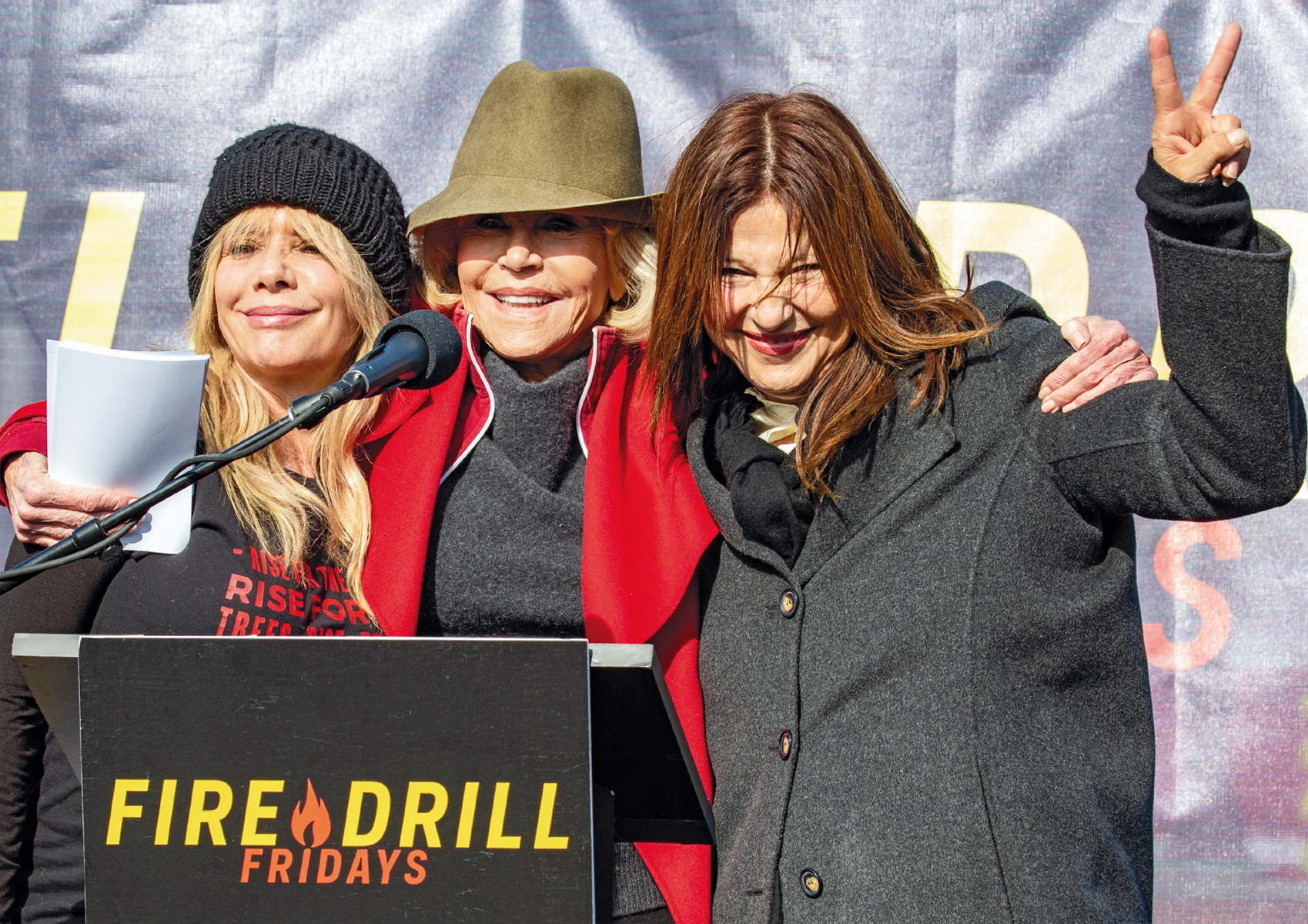
Rosanna Arquette and Catherine Keener join Jane onstage.
Конец ознакомительного фрагмента.
Текст предоставлен ООО «ЛитРес».
Прочитайте эту книгу целиком, купив полную легальную версию на ЛитРес.
Безопасно оплатить книгу можно банковской картой Visa, MasterCard, Maestro, со счета мобильного телефона, с платежного терминала, в салоне МТС или Связной, через PayPal, WebMoney, Яндекс.Деньги, QIWI Кошелек, бонусными картами или другим удобным Вам способом.
Вы ознакомились с фрагментом книги.
Для бесплатного чтения открыта только часть текста.
Приобретайте полный текст книги у нашего партнера:
Всего 10 форматов